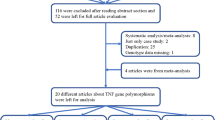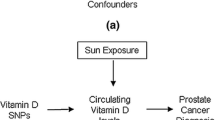Abstract
Background
Presence of xenotropic murine leukemia virus–related virus and chronic inflammation in prostate tumor suggests that inflammation plays a role in prostate cancer etiology. This study investigated whether variants in inflammatory genes act alone or interact with plasma antioxidants to influence prostate cancer risk in a population-based case–control study in Central Arkansas.
Methods
Cases (n = 193) were men, aged 40–80, diagnosed with prostate cancer in three major hospitals in 1998–2003, and controls (n = 197) were matched to cases by age, race, and county of residence.
Results
After adjustment for confounders, polymorphisms in COX-2 (rs689466) and IL-8 (rs4073) were not significantly associated with prostate cancer risk. However, apparent interactions were observed between these genetic variants and plasma antioxidants on the risk of this malignancy. The protective effect of the mutant allele of the COX-2 polymorphism was more pronounced among subjects with high plasma levels of β-cryptoxanthin, lycopene, β-carotene, or selenium (≥median) [e.g., OR (95% CI): 0.37 (0.15, 0.86) (AG/GG vs. AA) for β-cryptoxanthin]. Conversely, the promoting effect of the variant allele of the IL-8 polymorphism was more remarkable in subjects with low plasma levels of Lutein/zeaxanthin, β-cryptoxanthin, and β-carotene (<median) [e.g., OR (95% CI): 2.44 (1.08, 5.75) (AT/TT vs. AA) for β-carotene].
Conclusions
We found that sequence variants in inflammatory genes interact with plasma antioxidants to modulate prostate cancer risk.
Similar content being viewed by others
References
Parkin DM, Bray F, Ferlay J, Pisani P (2005) Global cancer statistics, 2002. CA Cancer J Clin 55:74–108
American Cancer Society (2009) Cancer facts & figures. American Cancer Society, Atlanta
Li H, Kantoff PW, Giovannucci E et al (2005) Manganese superoxide dismutase polymorphism, prediagnostic antioxidant status, and risk of clinical significant prostate cancer. Cancer Res 65:2498–2504
van Gils CH, Bostick RM, Stern MC, Taylor JA (2002) Differences in base excision repair capacity may modulate the effect of dietary antioxidant intake on prostate cancer risk: an example of polymorphisms in the XRCC1 gene. Cancer Epidemiol Biomarkers Prev 11:1279–1284
De Marzo AM, Marchi VL, Epstein JI, Nelson WG (1999) Proliferative inflammatory atrophy of the prostate: implications for prostatic carcinogenesis. Am J Pathol 155:1985–1992
Schlaberg R, Choe DJ, Brown KR, Thaker HM, Singh IR (2009) XMRV is present in malignant prostatic epithelium and is associated with prostate cancer, especially high-grade tumors. Proc Natl Acad Sci USA 106:16351–16356
Dennis LK, Lynch CF, Torner JC (2002) Epidemiologic association between prostatitis and prostate cancer. Urology 60:78–83
Dennis LK, Dawson DV (2002) Meta-analysis of measures of sexual activity and prostate cancer. Epidemiology 13:72–79
Mahmud S, Franco E, Aprikian A (2004) Prostate cancer and use of nonsteroidal anti-inflammatory drugs: systematic review and meta-analysis. Br J Cancer 90:93–99
De Marzo AM, Platz EA, Sutcliffe S et al (2007) Inflammation in prostate carcinogenesis. Nat Rev Cancer 7:256–269
Goode EL, Ulrich CM, Potter JD (2002) Polymorphisms in DNA repair genes and associations with cancer risk. Cancer Epidemiol Biomarkers Prev 11:1513–1530
Xu J, Zheng SL, Turner A et al (2002) Associations between hOGG1 sequence variants and prostate cancer susceptibility. Cancer Res 62:2253–2257
Stone A, Ratnasinghe LD, Emerson GL et al (2005) CYP3A43 Pro(340)Ala polymorphism and prostate cancer risk in African Americans and Caucasians. Cancer Epidemiol Biomarkers Prev 14:1257–1261
Zhang J, Dhakal IB, Greene G, Lang NP, Kadlubar FF (2010) Polymorphisms in hOGG1 and XRCC1 and risk of prostate cancer: effects modified by plasma antioxidants. Urology 75:779–785
El-Sohemy A, Baylin A, Kabagambe E, Ascherio A, Spiegelman D, Campos H (2002) Individual carotenoid concentrations in adipose tissue and plasma as biomarkers of dietary intake. Am J Clin Nutr 76:172–179
Platz EA, De Marzo AM (2004) Epidemiology of inflammation and prostate cancer. J Urol 171(2 Pt 2):S36–S40
McCarron SL, Edwards S, Evans PR et al (2002) Influence of cytokine gene polymorphisms on the development of prostate cancer. Cancer Res 62:3369–3372
Bidwell J, Keen L, Gallagher G et al (2001) Cytokine gene polymorphism in human disease: on-line databases, supplement 1. Genes Immun 2:61–70
Nelson WG, De Marzo AM, DeWeese TL, Isaacs WB (2004) The role of inflammation in the pathogenesis of prostate cancer. J Urol 172(5 Pt 2):S6–S11 discussion S11-12
Cheng I, Liu X, Plummer SJ, Krumroy LM, Casey G, Witte JS (2007) COX2 genetic variation, NSAIDs, and advanced prostate cancer risk. Br J Cancer 97:557–561
Zhang X, Miao X, Tan W et al (2005) Identification of functional genetic variants in cyclooxygenase-2 and their association with risk of esophageal cancer. Gastroenterology 129:565–576
Koch AE, Polverini PJ, Kunkel SL et al (1992) Interleukin-8 as a macrophage-derived mediator of angiogenesis. Science 258:1798–1801
Kim SJ, Uehara H, Karashima T, McCarty M, Shih N, Fidler IJ (2001) Expression of interleukin-8 correlates with angiogenesis, tumorigenicity, and metastasis of human prostate cancer cells implanted orthotopically in nude mice. Neoplasia 3:33–42
Inoue K, Slaton JW, Eve BY et al (2000) Interleukin 8 expression regulates tumorigenicity and metastases in androgen-independent prostate cancer. Clin Cancer Res 6:2104–2119
Veltri RW, Miller MC, Zhao G et al (1999) Interleukin-8 serum levels in patients with benign prostatic hyperplasia and prostate cancer. Urology 53:139–147
Michaud DS, Daugherty SE, Berndt SI et al (2006) Genetic polymorphisms of interleukin-1B (IL-1B), IL-6, IL-8, and IL-10 and risk of prostate cancer. Cancer Res 66:4525–4530
Hull J, Thomson A, Kwiatkowski D (2000) Association of respiratory syncytial virus bronchiolitis with the interleukin 8 gene region in UK families. Thorax 55:1023–1027
Zhang J, Dhakal I, Stone A et al (2007) Plasma carotenoids and prostate cancer: a population-based case-control study in Arkansas. Nutr Cancer 59:46–53
Guo Y, Zhang X, Tan W et al (2007) Platelet 12-lipoxygenase Arg261Gln polymorphism: functional characterization and association with risk of esophageal squamous cell carcinoma in combination with COX-2 polymorphisms. Pharmacogenet Genomics 17:197–205
Saenz-Lopez P, Carretero R, Cozar JM et al (2008) Genetic polymorphisms of RANTES, IL1-A, MCP-1 and TNF-A genes in patients with prostate cancer. BMC Cancer 8:382
Danforth KN, Rodriguez C, Hayes RB et al (2008) TNF polymorphisms and prostate cancer risk. Prostate 68:400–407
Moore SC, Leitzmann MF, Albanes D et al (2009) Adipokine genes and prostate cancer risk. Int J Cancer 124:869–876
Pierce BL, Biggs ML, DeCambre M et al (2009) C-reactive protein, interleukin-6, and prostate cancer risk in men aged 65 years and older. Cancer Causes Control 20:1193–1203
Sun J, Hedelin M, Zheng SL et al (2004) Interleukin-6 sequence variants are not associated with prostate cancer risk. Cancer Epidemiol Biomarkers Prev 13:1677–1679
Stark JR, Li H, Kraft P et al (2009) Circulating prediagnostic interleukin-6 and C-reactive protein and prostate cancer incidence and mortality. Int J Cancer 124:2683–2689
Willett WC, Lenart E (1998) Reproducibility and validity of food-frequency questionnaire. In: Willett WC (ed) Nutritional epidemiology, 2nd edn. Oxford University Press, New York, NY, pp 101–147
Hughes C, Murphy A, Martin C, Sheils O, O’Leary J (2005) Molecular pathology of prostate cancer. J Clin Pathol 58:673–684
Comstock GW, Alberg AJ, Helzlsouer KJ (1993) Reported effects of long-term freezer storage on concentrations of retinol, beta-carotene, and alpha-tocopherol in serum or plasma summarized. Clin Chem 39:1075–1078
Acknowledgments
This study is supported by a fund from the Arkansas Department of Health (Dr. Zhang, PI) and a grant from the National Institute on Aging, NIH (1R01AG15722, Dr. Lang, PI). We are grateful to Angie Stone for her assistance in DNA extraction and genotyping.
Author information
Authors and Affiliations
Corresponding author
Rights and permissions
About this article
Cite this article
Zhang, J., Dhakal, I.B., Lang, N.P. et al. Polymorphisms in inflammatory genes, plasma antioxidants, and prostate cancer risk. Cancer Causes Control 21, 1437–1444 (2010). https://doi.org/10.1007/s10552-010-9571-0
Received:
Accepted:
Published:
Issue Date:
DOI: https://doi.org/10.1007/s10552-010-9571-0




